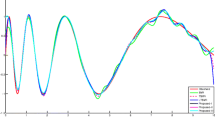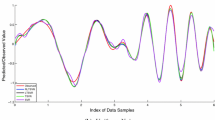Abstract
This paper investigates the online learning problem of Lagrangian \(\varepsilon\)-twin support vector regression (L-\(\varepsilon\)-TSVR), with the goal of presenting incremental implementations. First, to solve the problem that the existing L-\(\varepsilon\)-TSVR cannot efficiently update the model under incremental scenarios, an incremental Lagrangian \(\varepsilon\)-twin support vector regression (IL-\(\varepsilon\)-TSVR) based on the semi-smooth Newton method is proposed. By utilizing the matrix inverse theorems to update the Hessian matrices incrementally, IL-\(\varepsilon\)-TSVR lowers the time complexity and expedites the training process. However, when solving the problem of nonlinear case, the training speed of IL-\(\varepsilon\)-TSVR rapidly decreases with the increasing size of the kernel matrix. Therefore, an incremental reduced Lagrangian \(\varepsilon\)-twin support vector regression (IRL-\(\varepsilon\)-TSVR) is presented. IRL-\(\varepsilon\)-TSVR employs the reduced technique to restrict the size of the inverse matrix at the cost of slightly lower the prediction accuracy. Next, to lighten the prediction accuracy loss caused by parameters reduction, a novel regularization term is introduced to replace the original one, and an improved incremental reduced Lagrangian \(\varepsilon\)-twin support vector regression (IIRL-\(\varepsilon\)-TSVR) is designed. The results on UCI benchmark datasets show that IL-\(\varepsilon\)-TSVR can effectively address the linear regression problem under incremental scenarios and obtain almost the same generalization capability as offline learning. Moreover, IRL-\(\varepsilon\)-TSVR and IIRL-\(\varepsilon\)-TSVR can reduce training time of nonlinear regression model and obtain sparse solution, and their generalization capabilities are close to those of offline ones. Particularly, the proposed algorithms can implement fast incremental learning of large-scale data.





Similar content being viewed by others
Availability of data and material
All benchmark datasets used in this paper can be accessed from the UCI machine learning repository.
References
Ahmadi M, Jafarzadeh-Ghoushchi S, Taghizadeh R, Sharifi A (2019) Presentation of a new hybrid approach for forecasting economic growth using artificial intelligence approaches. Neural Comput Appl 31(12):8661–8680
Ahmadi M, Taghavirashidizadeh A, Javaheri D, Masoumian A, Jafarzadeh Ghoushchi S, Pourasad Y (2021) DQRE-SCnet: a novel hybrid approach for selecting users in federated learning with deep-Q-reinforcement learning based on spectral clustering. J King Saud Univ-Comput Inf Sci (in press)
Brugger D, Rosenstiel W, Bogdan M (2011) Online SVR training by solving the primal optimization problem. J Signal Process Syst 65:391–402
Burges CJC (1998) A tutorial on support vector machines for pattern recognition. Data Min Knowl Disc 2(2):121–167
Cao J, Gu BJ, Xiong WL, Pan F (2021) Incremental reduced least squares twin support vector regression. J Front Comput Sci Technol 15(3):553–563
Cao J, Gu BJ, Pan F, Xiong WL (2022) Accurate incremental ε-twin support vector regression. Control Theory Appl 39(6):1020–1032
Cauwenberghs G, Poggio T (2001) Incremental and decremental support vector machine learning. In: International conference on neural information processing systems. MIT Press
Chang CC, Lin CJ (2001) Training ν-support vector classifiers: theory and algorithms. Neural Comput 13(9):2119–2147
Chen YT, Xiong J, Xu WH, Zuo JW (2019) A novel online incremental and decremental learning algorithm based on variable support vector machine. Clust Comput 22(3):7435–7445
Cortes C, Vapnik V (1995) Support vector networks. Mach Learn 20(3):273–297
Crammer K, Dekel O, Keshet J, Shalev-Shwartz S, Singer Y (2006) Online passive-aggressive algorithms. J Mach Learn Res 7(3):551–558
Cristianini N, Shawe-Talyor J (2000) An introduction to support vector machines and other kernel-based learning methods. Cambridge University Press, Cambridge
Ding SF, Huang HJ (2017) Least squares twin parametric insensitive support vector regression. J Softw 28(12):3146–3155
Gama J, Žliobaitė I, Bifet A, Pechenizkiy M, Bouchachia A (2014) A survey on concept drift adaptation. ACM Comput Surv 46(4):44
Gan L, Yang M (2019) Pedestrian detection method based on ensemble SVM classifier. Comput Eng Appl 55(7):194–198
Golub GH, Van Loan CF (1996) Matrix computations, 3rd edn. John Hopkins University Press, Baltimore
Gu BJ, Pan F (2016) Accurate incremental online ν-support vector regression learning algorithm. Control Theory Appl 33(4):466–478
Gu B, Sheng VS (2013) Feasibility and finite convergence analysis for accurate on-line ν-support vector machine. IEEE Trans Neural Netw Learn Syst 24(8):1304–1315
Gu B, Wang JD, Yu YC, Zheng GS, Huang YF et al (2012) Accurate on-line ν-support vector learning. Neural Netw 27:51–59
Gu B, Sheng VS, Wang Z, Ho D, Osman S et al (2015) Incremental learning for ν-support vector regression. Neural Netw 67:140–150
Gu BJ, Fang JW, Pan F, Bai ZH (2020) Fast clustering-based weighted twin support vector regression. Soft Comput 24(8):6101–6117
Hao YH, Zhang HF (2016) Incremental learning algorithm based on twin support vector regression. Comput Sci 43(2):230–239
Hu ZH, Xu YW, Zhao XL, He J, Zhou Y (2015) Multi-feature selection tracking based on support vector machine. J Appl Sci 33(5):502–517
Hua XP, Xu S, Gao J, Ding SF (2019) L1-norm loss-based projection twin support vector machine for binary classification. Soft Comput 23(21):10649–10659
Huang HJ, Ding SF, Shi ZZ (2013) Primal least squares twin support vector regression. J Zhejiang Univ-Sci C-Comput Electron 14(9):722–732
Jayadeva, Khemchandani R, Chandra S (2007) Twin support vector machines for pattern classification. IEEE Trans Pattern Anal Mach Intell 29(5):905–910
Karasuyama M, Takeuchi I (2010) Multiple incremental decremental learning of support vector machines. IEEE Trans Neural Netw 21(7):1048–1059
Kumar MA, Gopal M (2009) Least squares twin support vector machines for pattern classification. Expert Syst Appl 36(4):7535–7543
Laskov P, Gehl C, Krüger S, Müller KR (2006) Incremental support vector learning: analysis, implementation and application. J Mach Learn Res 7:1909–1936
Le T, Nguyen TD, Nguyen V, Phung D (2017) Approximation vector machines for large-scale online learning. J Mach Learn Res 18(111):1–55
Lilleberg J, Zhu Y, Zhang Y (2015) Support vector machines and word2vec for text classification with semantic features. In: International conference on cognitive informatics and cognitive computing. IEEE
Lu J, Steven CHH, Wang JL, Zhao PL, Liu ZY (2016) Large scale online kernel learning. J Mach Learn Res 17:1–43
Ma JS, Theiler J, Perkins S (2003) Accurate on-line support vector regression. Neural Comput 15(11):2683–2703
Melki G, Kecman V, Ventura S, Cano A (2018) OLLAWV: online learning algorithm using worst-violators. Appl Soft Comput 66:384–393
Pang XY, Xu YT (2019) A safe screening rule for accelerating weighted twin support vector machine. Soft Comput 23(17):7725–7739
Peng XJ (2010) TSVR: an efficient twin support vector machine for regression. Neural Netw 23(3):365–372
Qi HD, Sun DF (2006) A quadratically convergent newton method for computing the nearest correlation matrix. SIAM J Matrix Anal Appl 28(2):360–385
Rastogi R, Anand P, Chandra S (2017) A ν-twin support vector machine based on regression with automatic accuracy control. Appl Intell 46(3):670–683
Ruan JH, Shi Y, Yang J (2011) Forest fires burned area prediction based on support vector machines with feature selection. ICIC Express Lett 5(8):2597–2603
Shao YH, Zhang CH, Yang ZM, Ling J, Deng NY (2013) An ε-twin support vector machine for regression. Neural Comput Appl 23(1):175–185
Singh M, Chadha J, Ahuja P, Jayadeva CS (2011) Reduced twin support vector regression. Neurocomputing 74(9):1474–1477
Tanveer M, Shubham K (2017) A regularization on Lagrangian twin support vector regression. Int J Mach Learn Cybern 8(3):807–821
Tanveer M, Shubham K, Aldhaifallah M, Nisar KS (2016) An efficient implicit regularized Lagrangian twin support vector regression. Appl Intell 44(4):831–848
Tanveer M, Tiwari A, Choudhary R, Jalan S (2019) Sparse pinball twin support vector machines. Appl Soft Comput J 78:164–175
Vapnik VN (1999) An overview of statistical learning theory. IEEE Trans Neural Netw 10(5):988–999
Wang D, Qiao H, Zhang B, Wang M (2013) Online support vector machine based on convex hull vertices selection. IEEE Trans Neural Netw Learn Syst 24(4):593–609
Wang LD, Gao C, Zhao NN, Chen XB (2019) A projection wavelet weighted twin support vector regression and its primal solution. Appl Intell 49(8):3061–3081
Yin J, Li Q (2019) A semismooth Newton method for support vector classification and regression. Comput Optim Appl 73(2):477–508
Zhang HR, Wang XD (2006) Incremental and online learning algorithm for regression least squares support vector machine. Chin J Comput 29(3):400–406
Zhang ZQ, Lv TL, Wang H, Liu LM, Tan JY (2018) A novel least square twin support vector regression. Neural Process Lett 48(2):1187–1200
Zhao YP, Sun JG, Du ZH, Zhang ZA, Li YB (2012) Online independent reduced least squares support vector regression. Inf Sci 201:37–52
Zheng J, Shen FR, Fan HJ, Zhao JX (2013) An incremental learning support vector machine for large-scale data. Neural Comput Appl 22(5):1023–1035
Funding
This research was funded by the National Natural Science Foundation of China under Grant No. 61773182.
Author information
Authors and Affiliations
Contributions
BG done conceptualization and methodology. JC performed writing original draft preparation, investigation, and software. FP done validation and supervision. WX done funding acquisition. All authors read and approved the final manuscript.
Corresponding author
Ethics declarations
Conflict of interest
All authors declare that there is no conflict of interests.
Ethical approval
This paper has not been previously published elsewhere, and it is not currently being considered for publication elsewhere.
Informed consent
Not applicable.
Additional information
Publisher's Note
Springer Nature remains neutral with regard to jurisdictional claims in published maps and institutional affiliations.
Rights and permissions
Springer Nature or its licensor (e.g. a society or other partner) holds exclusive rights to this article under a publishing agreement with the author(s) or other rightsholder(s); author self-archiving of the accepted manuscript version of this article is solely governed by the terms of such publishing agreement and applicable law.
About this article
Cite this article
Gu, B., Cao, J., Pan, F. et al. Incremental learning for Lagrangian ε-twin support vector regression. Soft Comput 27, 5357–5375 (2023). https://doi.org/10.1007/s00500-022-07755-9
Accepted:
Published:
Issue Date:
DOI: https://doi.org/10.1007/s00500-022-07755-9




